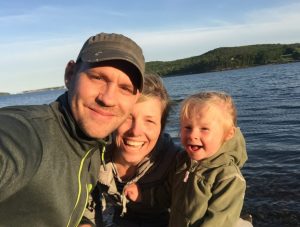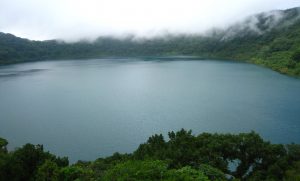Five Questions with Mike DeFranco
Mike DeFranco collects reasons why the world needs public health.

Mike takes in the Bar Harbor scenery with his wife, Kelly, and daughter, Ryan. (Contributed photo)
Name: Mike DeFranco
Position: Graduate student, Department of Health Behavior
Time at UNC: I’m in my second year.
What I do at the Gillings School (and why I love it): With my practicum finished and one full semester of classes left, I’m focused on figuring out how to implement solutions in the real world. In public health, there are so many ongoing problems that we already have answers for but just haven’t gotten enough buy-in to address. I want to utilize concepts from health behavior and epidemiology within the field of infectious diseases. I want to really pin down why people do or don’t take basic steps – like using prophylactics or getting vaccinations – to protect themselves and their families.
What I really like about the Gillings School are the people I’ve met, especially within my department. I came here directly from a job as an emergency room trauma nurse in Baltimore, and I was used to an extremely chill attitude that exists in the ER setting. It’s just such an intense environment, and change is so constant, that you have to be flexible. When I got here, I appreciated that people in health behavior are similarly relaxed. We know that we all succeed together, and we share a sense of honor in what we do. I really believe that: Public health professionals have one of the few jobs left where our work absolutely makes life better for other people.
I got into this field of study: through a very long journey! I grew up in north central Massachusetts and went to college at a small liberal arts school in Vermont. That’s when the egg cracked and I realized that this is a large world and I’m a small person… but I still have the power to make change. I went to Guatemala with the Peace Corps in 2001 and stayed for 3.5 years to support ecotourism efforts in a park called Volcán de Ipala. My main projects with the park were to design and build an interpretive trail for visitors and to collaborate with families within a community atop the volcano who began offering lodging and food services to visitors. This experience reinforced the concept of how crucial the sustainability component of any project is. Will it last after you’re gone? Who will be the next caretaker?

A lake fills the crater of Volcán de Ipala, where Mike served as a Peace Corps volunteer.
One day, I was looking out over the boundary of this lush, untouched parkland and the agricultural fields just beyond. I thought, “What am I going to do with my life?” Until then, I’d thought about going into natural resource management or some aspect of environmental preservation, but my time abroad showed me that people who can barely tick the boxes for basic survival rarely have the ability to think about long-term initiatives like that. They just need to make it through another day. The thought came to me: “If we’re not healthy, why are we doing any of this?” That’s when I knew I wanted a career that would help people satisfy those basic needs first.
Between Peace Corps and graduate school: I worked as a nurse, which was unexpected. It came about as a consequence of the death of Don Chico, a friend and native of the area where I worked in Guatemala. That incident taught me that life is all about timing. He was shot in an incident near the top of the volcano, and his son came running to the park offices for help. A group of us carried Don Chico down the mountain to meet a car and get him to the nearest hospital. By the time we made it to the parking lot, though, we had lost him. And that’s the thing: Even later, after I was a trained ER trauma nurse, I knew we never had a chance to save him. The simple truth is, the faster you can intervene – whether in medicine or, to some degree, in public health – the better the outcome is going to be for the people involved.
So, that moment shifted my focus from public health to a more clinical approach via nursing. I felt a deep calling to learn skills that would have a direct impact; I wanted to be able to help people in need. I earned a bachelor of science in nursing from Johns Hopkins University’s School of Nursing and went on to work in the emergency department at the Johns Hopkins Bayview Medical Center for 8.5 years. It gave me an awesome, incredibly practical experience. We had so many people come into the ER for emergency care who already were overloaded with ongoing health problems. There were so many variables contributing to their poor health that the emergent matters causing them to present to the ER were simply compounded by their co-morbidities. You could treat the immediate concern and ultimately send the patient home, but it was clear that major lifestyle changes were needed to make any significant improvement in these people’s overall daily quality of life.
Anyway, I met my wife, Kelly, in nursing school – the greatest highlight of my nursing education. Eventually, we both reached a point in our careers where we just needed to try something new and have a change of scene. I circled back to public health and applied to the Gillings School. I actually had to defer acceptance for a year because our daughter, Ryan, was born with some health concerns. I’m thrilled to say she’s amazing, and she’s doing just great now!
The next step in my career: probably has to do with infectious diseases, namely neglected tropical diseases. I’ve been talking a lot with Dr. Jim Herrington [Professor of the Practice of health behavior and executive director of the Gillings Global Gateway™] about treatable diseases that just haven’t gotten the attention of other infectious diseases like HIV/AIDS. Of course we want to find solutions for all these problems, but it blows my mind that with so many tropical diseases, we already have treatments in hand. If we just had the funding, we could immediately intervene and drastically improve so many lives. We’ve got to build the collective will to implement these solutions on a global scale.
A dream I want to achieve someday: is renting a VW camper van and exploring the mess out of New Zealand’s South Island with my family. A few years ago, my wife and I traveled all over the North Island for 10 days. I can’t wait to take our daughter and just have awesome explorations with this little person. We love all kinds of road trips, even if they don’t take us that far afield. Earlier this year, we went to Bar Harbor in Maine – that was spectacular.
